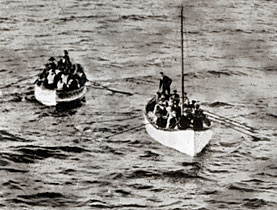
Good manners cost lives as Titanic sank

Well behaved British gentlemen were less likely to survive the sinking of the Titanic than pushy American passengers, according to Swiss and Australian research.
The statistical review of survivors and fatalities from the famous 1912 shipping disaster concludes that many people observe social norms rather than panic even when their lives are at risk.
The supposedly unsinkable Titanic ocean liner lost 1,517 passengers and crew when it hit an iceberg and went down on its maiden voyage to New York in 1912. The 2,223 passengers and crew on board were mainly of British, United States, Irish and Scandinavian origin.
Bruno Frey, a professor from Zurich University, together with David Savage from the Queensland University of Technology demonstrated that British passengers had a ten per cent lower chance of staying alive than passengers from other countries.
Those from the US had a 12 per cent higher survival rate than their British counterparts.
Fight for lives
Frey believes that the higher proportion of casualties among the British was down to their rigid adherence to social conventions and the “stiff upper lip” mentality that was prevalent at the time.
“When the Titanic sank the social norm of saving women and children first was upheld to a very large degree,” he told swissinfo. But Americans of that period appeared to value their lives more highly than doing the “right thing”, he added.
“One possibility is that Americans are more individualistic and in these circumstances fight for their lives and are able to survive. Another interpretation is that they were not aware of the social norm of women and children first,” Frey said.
The study is part of an ongoing statistical research project that aims to demonstrate how people react in life and death situations. The Titanic disaster proved to be a good case study because so much data – from passenger lists, public inquiries and survivor accounts – still exists.
Frey said he was surprised by the results of the research that disproved his theory that people act in a self-interested manner under conditions of extreme duress.
Don’t panic!
“My hypothesis was that adult males, who are stronger than women and children, would be much more likely to save themselves. But we found that women had a much higher chance of survival than men,” he said.
The study, that has not yet been published, found that the survival rate among women was 53 per cent higher than men and 15 per cent higher for children than adults.
Frey likened the orderly behaviour on board the Titanic to the recent crash landing of an aircraft in the Hudson river in New York.
“It appears that in situations of extreme danger people do not panic and push each other out of the way but are surprisingly well behaved in general,” he said.
“We want to find the conditions in which either panic or orderly behaviour occurs, when social norms are activated or not.
“We know that under certain circumstances people do panic but in very many others they do not. We don’t know exactly what these circumstances are.”
swissinfo, Matthew Allen in Zurich
The five-man music ensemble was founded in 1983 and performs both classical, light and chamber music from every period, as well as country music.
The ensemble hit international headlines after playing the ship’s band in the 1997 James Cameron blockbuster Titanic.
The White Star Line RMS Titanic was the biggest, and reputedly the safest, passenger steamship of its day. It began its maiden voyage from Southampton to New York on April 10, 1912 with 2,223 passengers on board.
On the night of April 14, the ship hit an iceberg 400 miles off the coast of Newfoundland. The ship sunk in just two hours and 40 minutes in the early hours of April 15.
The speed of the Titanic’s demise, coupled with a lack of lifeboats and the freezing water conditions, meant that only 706 passengers and crew survived.
The highest proportion of survivors were first-class passengers, whose cabins were highest above the water line and closest to the lifeboats. The lowest survival rate was among the crew, including captain Edward J. Smith who went down with his ship. Smith reportedly shouted “Be British, boys, be British,” as the Titanic sank.
The wreck of the Titanic was discovered in 1985 by a joint US-French expedition.
There have been several movies featuring the famous disaster, most notably the Hollywood blockbuster “Titanic”, starring Kate Winslet and Leonardo DiCaprio in 1997.

In compliance with the JTI standards
More: SWI swissinfo.ch certified by the Journalism Trust Initiative





























You can find an overview of ongoing debates with our journalists here . Please join us!
If you want to start a conversation about a topic raised in this article or want to report factual errors, email us at english@swissinfo.ch.